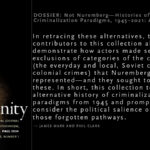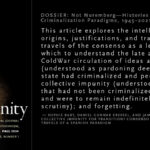The Western myth of Nuremberg has dominated understandings of the evolution of international criminal law. Enshrining the International Military Tribunal as a critical point of origin, this paradigm has developed a narrative of post-war liberal progress, in which a universal model of externally-delivered, individualised criminal justice was interrupted by the exigencies of the Cold War then rediscovered through various international and hybrid tribunals in the 1990s and early 2000s, culminating in the creation of the International Criminal Court in 2002. Often instrumentalised to protect Western Continue reading → Continue reading →
Before South Africa’s Truth and Reconciliation, there was the Spanish consenso. The idea of negotiated and peaceful consensus it embodied, as a way to overcome violent pasts after the end of dictatorship, was forged in the work of Communists, Socialists, Christian Democrats and human rights organisations both internationally and in Spain from the late 1950s onwards. Following the death of Franco and Spain’s successful democratization from the late 1970s, it would then become an influential approach that travelled internationally for two decades. This article highlights the role Continue reading → Continue reading →


